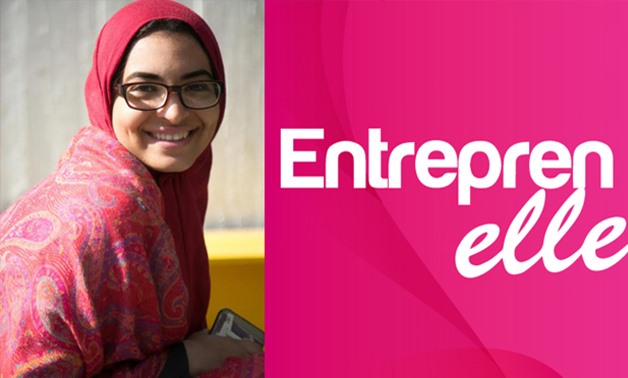
Rania Ayman, 25-year old Egyptian entrepreneur and founder of Entreprenelle platform to help women start their own businesses - File Photo
CAIRO – 28 November 2017: With a strong will and a passion for marketing, 25-year-old Rania Ayman has created a platform to mentor and help women of all ages through the process of starting their own businesses. Founded in 2016, Entreprenelle wants to help fellow women become entrepreneurs by providing them with relevant education, training, awareness, resources and support. The platform has already facilitated over 60 workshops around the country and partnered with more than 30 businesswomen.
Since her first year at university, Ayman started looking for jobs in marketing and advertising, but employers in such a demanding field were reluctant to hire a woman, she recounts. “Because I am a woman, they thought it meant that I would not be able to go out as I would like,” Ayman adds.
Nonetheless, Ayman was persistent and managed to join the industry, and after working in advertising and marketing for a few years, she decided to launch her own company, in addition to freelance projects with clients like Google and Microsoft.
One of the projects she managed was the Startup Grind, created in partnership with Google to support entrepreneurs around the world. She noticed a trend when it came to the events they hosted: No women attended the events that focus on technology and entrepreneurship. “It got to the point where in one of our events out of 50 people there were no women except the host and the speaker’s fiancée,” Ayman recalls.
After conducting more research and studies, Ayman decided to create her own initiative with a model that would suit women in Egypt, especially after discovering that Egypt has one of the highest divorce rates. Most of these women have children, and in most cases their families wouldn’t want to support them financially. She adds that statistics indicate that 12 percent of people who have startups in the Middle East are women, while only 17 percent to 23 percent of women in Egypt work. The idea of Entreprenelle is to create a bridge between women who are interested in starting their own businesses so they can support themselves and their children.
“Our first event was in partnership with Google’s Startup Grind called She Can. That’s when women started coming to the events. I later realized that the problem is not the attendance of women, but the fact that they do not understand how to take the initiatives to start their own business,” Ayman emphasizes. She recalls that when she was starting up her own advertising agency, she did not find anyone to guide her through the process.
With Entreprenelle, she faced another set of challenges “because there was no such thing as social entrepreneurship in Egypt...I faced stigma in the field because I was young and doing something for women,” she says. “People didn’t want to work with me at first because they thought that I would not be committed enough and conform to the ideal gender roles, which is getting married and staying at home...They didn’t understand the concept of a business model that makes money and helps the society but is not an NGO.”
Entreprenelle works with four aspects: awareness, education, resources accessibility and economic environment. Most people know Entreprenelle through inspirational events where they explain to women what entrepreneurship and startups are, how to start your own business and show them success stories.
The networking platform is keen to be as inclusive as possible, especially in places where women do not have access to resources. They host their events in Cairo, as well as other governorates like Alexandria, Mansoura, Minya, Assiut and Port Said. They also hold programs like trainings, workshops and industry-based experience to educate women about entrepreneurship. Their online content acts as a localized platform for users who “want content that is suitable for their circumstances. For example, if a woman is a stay-at-home mother, you can’t tell her to go attend a course training somewhere because it is not suitable for her conditions, instead, we give them access to these courses and training online,” Ayman explains. The content available is also translated into Arabic to ensure that the targeted women are able to read it.
Most people are able to reach Entreprenelle through social media or their partners. “In every governorate, we have volunteers and partners...And on social media we have a strong outreach and exposure because women really are looking for such platform. So we make sure that we reach every single woman in Egypt,” Ayman says. “I don’t want to help those 6,000 girls who attend our events, I want to help the 9 million Egyptian girls who are on social media.”
Fighting gender based violence and discrimination can take many forms, including highlighting and documenting female role models who challenged stereotypical gender roles. Doing this normalizes women’s presence in sectors recognized as “male only fields” and betters perceptions of successful female entrepreneurs. This article is part of Egypt Today’s campaign “Break the Silence ... Say No to Violence” marking the 16-Day campaign of activism against gender-based violence GBV from November 25 to December 10.


Comments
Leave a Comment